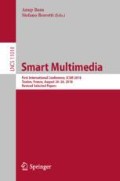Abstract
Ontology is able to understand the association between concepts and the relationships within contents. We argue that, ontology could compete with machine learning in detecting sentiments contained in textual messages. Current ontology-based sentiment models are domain specific, which limits their ability to adapt to different domains. In this work, we propose a general sentiment ontology (Affectional Ontology) using various sentiment lexicons and psychological-based resources. To provide an efficient evaluation on the Affectional Ontology, we propose a domain-free sentiment multimedia dataset (DFSMD). Our DFSMD was constructed with high standard annotation criteria. The results of our work show the effectiveness of the proposed ontology in capturing the sentiment, when compared to the machine learning approach. The proposed DFSMD is publicly available and can be used in various sentiment analysis problems without the restrictions of particular domains or aspects.
Access this chapter
Tax calculation will be finalised at checkout
Purchases are for personal use only
Notes
- 1.
- 2.
- 3.
- 4.
- 5.
- 6.
- 7.
- 8.
- 9.
- 10.
- 11.
- 12.
- 13.
- 14.
- 15.
- 16.
- 17.
- 18.
References
Abaalkhail, R., Guthier, B., Alharthi, R., El Saddik, A.: Survey on ontologies for affective states and their influences. Semant. Web, 1–18 (2016). https://doi.org/10.3233/SW-170270
Alharthi, R., Guthier, B., Guertin, C., El Saddik, A.: A dataset for psychological human needs detection from social networks. IEEE Access 5, 9109–9117 (2017). https://doi.org/10.1109/ACCESS.2017.2706084
Jurafsky, D., Martin, J.H., Lexicons for sentiment and affect extraction. In: Speech and Language Processing, pp. 326–344. Pearson London (2014). https://doi.org/10.1162/089120100750105975
Cowie, R., Douglas-Cowie, E., Apolloni, B., Taylor, J., Romano, A., Fellenz, W., et al.: What a neural net needs to know about emotion words. Comput. Intell. Appl. 404, 5311–5316 (1999)
Davidov, D., Tsur, O., Rappoport, A.: Enhanced sentiment learning using Twitter hashtags and smileys. In: Proceedings of the 23rd International Conference on Computational Linguistics: Posters, pp. 241–249. Association for Computational Linguistics (2010)
Frijda, N.H.: The Emotions. Cambridge University Press (1986). https://doi.org/10.1017/9781316275221
Fujita, F., Diener, E., Sandvik, E.: Gender differences in negative affect and well-being: the case for emotional intensity. J. Pers. Soc. Psychol. 61(3), 427 (1991)
Go, A., Bhayani, R., Huang, : L.: Twitter sentiment classification using distant supervision. CS224N Project Report, Stanford, vol. 1, no. 2009, p. 12 (2009)
Hogenboom, A., Bal, D., Frasincar, F., Bal, M., De Jong, F., Kaymak, U.: Exploiting emoticons in polarity classification of text. J. Web Eng. 14(1–2), 22–40 (2015)
Hogenboom, A., Bal, D., Frasincar, F., Bal, M., de Jong, F., Kaymak, U.: Exploiting emoticons in sentiment analysis. In: Proceedings of the 28th Annual ACM Symposium on Applied Computing, pp. 703–710. ACM (2013). https://doi.org/10.1145/2480362.2480498
Hovy, E.H.: What are sentiment, affect, and emotion? Applying the methodology of michael Zock to sentiment analysis. In: Gala, N., Rapp, R., Bel-Enguix, G. (eds.) Language Production, Cognition, and the Lexicon. TSLT, vol. 48, pp. 13–24. Springer, Cham (2015). https://doi.org/10.1007/978-3-319-08043-7_2
Kiritchenko, S., Zhu, X., Mohammad, S.M.: Sentiment analysis of short informal texts. J. Artif. Intell. Res. 50, 723–762 (2014). https://doi.org/10.1613/jair.4272
Hu, M., Liu, B.: Mining and summarizing customer reviews. In: Proceedings of the Tenth ACM SIGKDD International Conference on Knowledge Discovery and Data Mining, KDD 2004, pp. 168–177. ACM, New York (2004).https://doi.org/10.1145/1014052.1014073
Kontopoulos, E., Berberidis, C., Dergiades, T., Bassiliades, N.: Ontology-based sentiment analysis of Twitter posts. Expert Syst. Appl. 40(10), 4065–4074 (2013). https://doi.org/10.1016/j.eswa.2013.01.001
Mohammad, S.M., Turney, P.D.: Crowdsourcing a word-emotion association lexicon. Comput. Intell. 29(3), 436–465 (2013). https://doi.org/10.1111/j.1467-8640.2012.00460.x
Nithish, R., Sabarish, S., Kishen, M.N., Abirami, A., Askarunisa, A.: An ontology based sentiment analysis for mobile products using tweets. In: 2013 Fifth International Conference on Advanced Computing (ICoAC), pp. 342–347. IEEE (2013). https://doi.org/10.1109/ICoAC.2013.6921974
Novak, P.K., Smailović, J., Sluban, B., Mozetič, I.: Sentiment of emojis. PloS One 10(12), e0144296 (2015)
Pak, A., Paroubek, P.: Twitter as a corpus for sentiment analysis and opinion mining. In: LREc, vol. 10 (2010). https://doi.org/10.17148/ijarcce.2016.51274
Parrott, W.G.: Emotions in Social Psychology: Essential Readings. Psychology Press, Hove (2001)
Ravi, K., Ravi, V.: A survey on opinion mining and sentiment analysis: tasks, approaches and applications. Knowl.-Based Syst. 89, 14–46 (2015). https://doi.org/10.1016/j.knosys.2015.06.015
Rosenthal, S., Farra, N., Nakov, P.: Semeval-2017 task 4: sentiment analysis in Twitter. In: Proceedings of the 11th International Workshop on Semantic Evaluation (SemEval-2017), pp. 502–518 (2017)
Sam, K.M., Chatwin, C.: Ontology-based sentiment analysis model of customer reviews for electronic products. In: Encyclopedia of Information Science and Technology, 3rd edn, pp. 892–904. IGI Global (2015). https://doi.org/10.4018/978-1-4666-5888-2.ch085
Snow, R., O’Connor, B., Jurafsky, D., Ng, A.Y.: Cheap and fast—but is itgood?: evaluating non-expert annotations for natural language tasks. In: Proceedings of the Conference on Empirical Methods in Natural Language Processing, pp. 254–263. Association for Computational Linguistics (2008)
Speriosu, M., Sudan, N., Upadhyay, S., Baldridge, J.: Twitter polarity classification with label propagation over lexical links and the follower graph. In: Proceedings of the First Workshop on Unsupervised Learning in NLP, pp. 53–63. Association for Computational Linguistics (2011)
Strapparava, C., Valitutti, A., et al.: Wordnet affect: an affective extension of wordnet. In: LREC, vol. 4, pp. 1083–1086 (2004)
Sykora, M.D., Jackson, T., O’Brien, A., Elayan, S.: Emotive ontology: extracting fine-grained emotions from terse, informal messages (2013)
Wierzbicka, A.: Emotions Across Languages and Cultures: Diversity and Universals. Cambridge University Press, Cambridge (1999). https://doi.org/10.1017/CBO9780511521256
Author information
Authors and Affiliations
Corresponding authors
Editor information
Editors and Affiliations
Rights and permissions
Copyright information
© 2018 Springer Nature Switzerland AG
About this paper
Cite this paper
Abaalkhail, R., Alzamzami, F., Aloufi, S., Alharthi, R., Saddik, A.E. (2018). Affectional Ontology and Multimedia Dataset for Sentiment Analysis. In: Basu, A., Berretti, S. (eds) Smart Multimedia. ICSM 2018. Lecture Notes in Computer Science(), vol 11010. Springer, Cham. https://doi.org/10.1007/978-3-030-04375-9_2
Download citation
DOI: https://doi.org/10.1007/978-3-030-04375-9_2
Published:
Publisher Name: Springer, Cham
Print ISBN: 978-3-030-04374-2
Online ISBN: 978-3-030-04375-9
eBook Packages: Computer ScienceComputer Science (R0)

